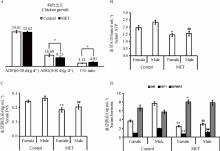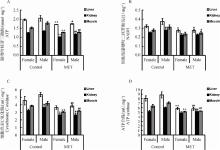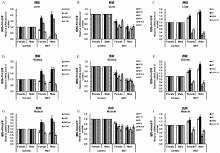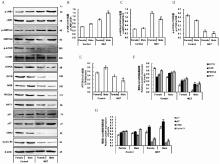





Acta Veterinaria et Zootechnica Sinica ›› 2025, Vol. 56 ›› Issue (9): 4673-4685.doi: 10.11843/j.issn.0366-6964.2025.09.044
• Basic Veterinary Medicine • Previous Articles Next Articles
SHI Mei( ), WEI Gege(
), WEI Gege( ), LI Yihan, WANG Xianzhong, ZHANG Jiaojiao*(
), LI Yihan, WANG Xianzhong, ZHANG Jiaojiao*( )
)
Received:2024-11-05
Online:2025-09-23
Published:2025-09-30
Contact:
ZHANG Jiaojiao
E-mail:s18286594692@163.com;18037650102@163.com;zhangjjff@126.com
CLC Number:
SHI Mei, WEI Gege, LI Yihan, WANG Xianzhong, ZHANG Jiaojiao. Metformin Regulates Chicken Growth Metabolism through LKB1/AMPKα2 Signaling Pathway[J]. Acta Veterinaria et Zootechnica Sinica, 2025, 56(9): 4673-4685.
Table 1
Primer sequences for RT-PCR"
| 基因 Gene | 序列号 Sequence number | 序列位置 Sequence position | 产物长度/bp Product length | 退火温度/℃ Annealing temperature | 序列(5′→3′) Sequence |
| β-actin | NM_205518.1 | 625-818 | 194 | 58 | F: GTGCGTGACATCAAGGAGAAGC R: CCACAGGACTCCATACCCAAGA |
| ATP5A1 | NM_204286.1 | 1 207-1 364 | 158 | 57 | F: GGTATCCGTCCAGCCATCAA R: GCATCCAAATCAGACCCAAACT |
| LKB1 | NM_001045833 | 971-1 129 | 159 | 55 | F: ATTCCAGCCACCAGAAATTG R: TCACCTTTCCCGATGTTTTC |
| AMPKα2 | NM_001039605.1 | 726-943 | 218 | 57 | F: GGAGGCGTGTTTTACATCCC R: AACTTCTCACAGACCTCCCG |
| mTOR | XM_417614.4 | 119-309 | 191 | 57 | F: TGAAGGGGTCAAGGCAATCC R: GGCGAGCAGTGGTTGTGGAT |
| IGF1 | NM_001004384.2 | 188-316 | 129 | 58 | F: AGTTCGTATGTGGAGACAGAGGC R: CCAGCCTCCTCAGGTCACAAC |
| IGF1R | NM_205032.1 | 2 961-3 114 | 154 | 57 | F: TTGTGCTCCCCATTGCTTTC R: GGAACGTACACATCCGAAGC |
| INS | NM_205222 | 126-308 | 183 | 59 | F: CACTGCCTCTTCTGGCTCTC R: GCAAGGGACTGCTCACTAGG |
| INSR | XM_001233398 | 2 303-2 462 | 160 | 57 | F: TGAGAGTGCAGAGGAGCAGA R: GGCACTGACATAAGCTGCAA |
| PIK3CA | NM_001004410 | 3 006-3 155 | 150 | 57 | F: AACATCTGGCAAAACCAAGG R: CTGCAATGCTCCCTTTAAGC |
| AKT1 | NM_205055.1 | 1 156-1 328 | 173 | 57 | F: AACGGAGGGGAGTTGTTTTT R: ATGTGCCCGTCTTTATCCAG |
| p21 | NM_204396 | 530-684 | 155 | 58 | F: TTTCCCTGCCCTGTACTGTC R: AGTCCTCCTCAGTCCCTTCC |
| p27 | NM_204256.2 | 922-1 102 | 181 | 58 | F: AGGCCGAAAGACTGATGTTG R: CGATTTCTTGGGTGTTTGCT |
| CDK2 | NM_001199857.1 | 386-562 | 177 | 58 | F: AACCCCAGAACCTCCTCATC R: TCCAGATGTCCACAGCAGTC |
| Cyclin E1 | NM_001031358.1 | 1 481-1 642 | 162 | 58 | F: CGCCAGCCACTTAAAAGAAC R: TGTCAACAGGGGACAGCATA |
Table 2
Primary and secondary antibodies used in Western blot"
| 目标蛋白 Target | 抗体名称 Name of antibody | 来源 Source and reference | 种属;克隆性 Species raised in; clonality | 稀释度 Dilution used | |
| 一抗 Primary antibodies | p-LKB1 | Anti-Phospho-LKB1 (Thr189) | Bioss Antibodies Inc., Woburn, MA, USA | Rabbit; polyclonal | 1∶300 |
| LKB1 | Anti-LKB1 | Bioss | Rabbit; polyclonal | 1∶500 | |
| p-AMPKα2 | Anti-phospho-AMPK alpha2 (Thr172) | Bioss | Rabbit; polyclonal | 1∶300 | |
| AMPKα2 | Anti-AMPK alpha2 | Abcam, Cambridge, MA, USA | Rabbit; polyclonal | 1∶500 | |
| p-mTOR | Anti-mTOR (phosphor S2448) | Abcam | Rabbit; monoclonal | 1∶1 000 | |
| mTOR | Anti-mTOR | Abcam | Rabbit; polyclonal | 1∶1 000 | |
| ATP5A | Anti-ATP5A | Abcam | Mouse; monoclonal | 1∶250 | |
| IGF1R | Anti-IGF1R | Bioss | Rabbit; polyclonal | 1∶500 | |
| INSR | Anti-Insulin Receptor | Bioss | Rabbit; polyclonal | 1∶500 | |
| PIK3CA | Anti-PIK3CA | Bioss | Rabbit; polyclonal | 1∶500 | |
| AKT1 | Anti-AKT1 | Abcam | Rabbit; polyclonal | 1∶500 | |
| p21 | p21 Polyclonal Antibody | Thermo Fisher Scientific, Waltham, MA, USA | Rabbit; polyclonal | 1∶500 | |
| p27 | Anti-CDKN1B/p27 KIP 1 | Bioss | Rabbit; polyclonal | 1∶500 | |
| CDK2 | Anti-CDK2 | Bioss | Rabbit; polyclonal | 1∶500 | |
| Cyclin E1 | Anti-Cyclin E1 | Bioss | Rabbit; polyclonal | 1∶500 | |
| Beta-actin | Beta-actin (AC-15) | Santa Cruz Biotechnology, Dallas, Texas, USA | Rabbit; polyclonal | 1∶1 000 | |
| 二抗 Secondary antibodies | Goat IgG | Anti-rabbit IgG H & L (HRP) | Abcam | Goat; polyclonal | 1∶5, 000 |
| Goat IgG | Anti-mouse IgG-HRP | Santa Cruz Biotechnology | Goat; polyclonal | 1∶5 000 |

Fig. 1
Effects of MET on chicken growth and growth-related hormones A. Effect of MET on chicken growth (ADFI. average daily feed intake; AGD. average daily gain; F/G ratio. feed/gain ratio; Data are expressed as "$\bar x \pm s$" (n=4, 40 chicks per group), *. P < 0.05 compared with the control group, according to the t test); B. Serum ATP level; C. Serum insulin (INS) level; D. Serum levels of growth hormone (GH), insulin-like growth factor 1 (IGF1), and insulin-like growth factor binding protein 2 (IGFBP2); in Fig. B-D, data are represented as "$\bar x \pm s$" (n=6 per group), *.P < 0.05 for the female treatment group compared with the female control group, **.P < 0.01 for the female treatment group compared with the female control group; #. P < 0.05 for the male treatment group compared with the male control group, ##. P < 0.01 for the male treatment group compared with the male control group, according to the t test"


Fig. 2
Effects of MET on ATP level and mitochondrial respiratory enzymes in the liver, kidney, and muscle of chicks A. ATP level; B. Nicotinamide adenine dinucleotide hydrogen (NADH) concentration; C. Cytochrome C oxidase activity; D. ATP synthase activity; Data are represented as "$\bar x \pm s$" (n=6 per group), *. P < 0.05 for the female treatment group compared with the female control group, **. P < 0.01 for the female treatment group compared with the female control group; #. P < 0.05 for the male treatment group compared with the male control group, ##. P < 0.01 for the male treatment group compared with the male control group, according to the t test"


Fig. 3
Effects of MET on mRNA levels of genes related to growth metabolism in the liver, kidney, and muscle of chicks A. Relative mRNA levels of ATP synthase F1 subunit α (ATP5A1), liver kinase B1 (LKB1), AMP-activated protein kinase α2 (AMPKα2), and mammalian target of rapamycin (mTOR) in the liver; B. Relative mRNA levels of insulin-like growth factor 1 (IGF1), insulin-like growth factor 1 receptor (IGF1R), insulin (INS), insulin receptor (INSR), phosphatidylinositol-4, 5-bisphosphate 3-kinase catalytic subunit alpha (PIK3CA), and AKT serine/threonine kinase 1 (AKT1) in the liver; C. Relative mRNA levels of p21, p27, Cyclin-dependent kinase 2 (CDK2), and Cyclin E1 in the liver; D-F and G-I show relative mRNA levels of the above genes in the kidney and muscle respectively; Data are represented as "$\bar x \pm s$"(n=3 per group), *. P < 0.05 for the female treatment group compared with the female control group, **. P < 0.01 for the female treatment group compared with the female control group; #. P < 0.05 for the male treatment group compared with the male control group, ##. P < 0.01 for the male treatment group compared with the male control group, according to the t test"


Fig. 4
Effects of MET on protein expressions related to growth metabolism in the muscle of chicks A. Western blot analysis of protein bands; B. p-LKB1/LKB1 ration; C. p-AMPKα2/AMPKα2 ration; D. p-mTOR/mTOR ration; E. Relative protein level of ATP5A; F. Relative protein levels of IGF1R, INSR, PIK3CA, and AKT1; G. Relative protein levels of p21, p27, CDK2, and Cyclin E1; Data are represented as "$\bar x \pm s$" (n=3 per group), *. P < 0.05 for the female treatment group compared with the female control group, **. P < 0.01 for the female treatment group compared with the female control group; #. P < 0.05 for the male treatment group compared with the male control group, ##. P < 0.01 for the male treatment group compared with the male control group, according to the t test"

| 1 | CHANJ C N,YANGA,CHUN,et al.Current type 2 diabetes guidelines: individualized treatment and how to make the most of metformin[J].Diabetes Obes Metab,2024,26(Suppl 3):55-74. |
| 2 |
YEREVANIANA,SOUKASA A.Metformin: mechanisms in human obesity and weight loss[J].Current obesity reports,2019,8(2):156-164.
doi: 10.1007/s13679-019-00335-3 |
| 3 |
HUAY,ZHENGY,YAOY,et al.Metformin and cancer hallmarks: shedding new lights on therapeutic repurposing[J].J Transl Med,2023,21(1):403.
doi: 10.1186/s12967-023-04263-8 |
| 4 |
LAMOIAT E,SHULMANG I.Cellular and molecular mechanisms of metformin action[J].Endocr Rev,2021,42(1):77-96.
doi: 10.1210/endrev/bnaa023 |
| 5 |
FONTAINEE.Metformin-induced mitochondrial complex I inhibition: facts, uncertainties, and consequences[J].Front Endocrinol (Lausanne),2018,9,753.
doi: 10.3389/fendo.2018.00753 |
| 6 |
WANGY,ANH,LIUT,et al.Metformin improves mitochondrial respiratory activity through activation of AMPK[J].Cell Rep,2019,29(6):1511-1523.
doi: 10.1016/j.celrep.2019.09.070 |
| 7 | AMENGUAL-CLADERAE,MORLA-BARCELOP M,MORN-COSTOYAA,et al.Metformin: from diabetes to cancer-unveiling molecular mechanisms and therapeutic strategies[J].Biology (Basel),2024,13(5):302. |
| 8 |
JOHANNSM,HUEL,RIDERM H.AMPK inhibits liver gluconeogenesis: fact or fiction?[J].Biochem J,2023,480(1):105-125.
doi: 10.1042/BCJ20220582 |
| 9 |
ZHUH,JIAZ,LIY R,et al.Molecular mechanisms of action of metformin: latest advances and therapeutic implications[J].Clin Exp Med,2023,23(7):2941-2951.
doi: 10.1007/s10238-023-01051-y |
| 10 |
FAUREM,GUIBERTE,ALVESS,et al.The insulin sensitiser metformin regulates chicken Sertoli and germ cell populations[J].Reproduction,2016,151(5):527-538.
doi: 10.1530/REP-15-0565 |
| 11 |
ZHAOJ,YANGP C,YANGH,et al.Dietary supplementation with metformin improves testis function and semen quality and increases antioxidants and autophagy capacity in goats[J].Theriogenology,2022,188,79-89.
doi: 10.1016/j.theriogenology.2022.05.030 |
| 12 |
HOLLSTEINP E,EICHNERL J,BRUNS N,et al.The AMPK-related kinases SIK1 and SIK3 mediate key tumor-suppressive effects of LKB1 in NSCLC[J].Cancer Discov,2019,9(11):1606-1627.
doi: 10.1158/2159-8290.CD-18-1261 |
| 13 |
MIHAYLOVAM M,SHAWR J.The AMPK signalling pathway coordinates cell growth, autophagy and metabolism[J].Nat Cell Biol,2011,13(9):1016-1023.
doi: 10.1038/ncb2329 |
| 14 |
YANGL,GARCIA CANAVERASJ C,CHENZ,et al.Serine catabolism feeds NADH when respiration is impaired[J].Cell Metab,2020,31(4):809-821.
doi: 10.1016/j.cmet.2020.02.017 |
| 15 |
DUTTAN,PEMMARAJUD B,GHOSHS,et al.Alkaloid-rich fraction of ervatamia coronaria sensitizes colorectal cancer through modulating AMPK and mTOR signalling pathways[J].J Ethnopharmacol,2022,283,114666.
doi: 10.1016/j.jep.2021.114666 |
| 16 |
GONZÁLEZA,HALLM N,LINS C,et al.AMPK and TOR: the yin and yang of cellular nutrient sensing and growth control[J].Cell Metab,2020,31(3):472-492.
doi: 10.1016/j.cmet.2020.01.015 |
| 17 |
CHENW L,WEIH W,CHIUW Z,et al.Metformin regulates hepatic lipid metabolism through activating AMP-activated protein kinase and inducing ATGL in laying hens[J].Eur J Pharmacol,2011,671(1-3):107-112.
doi: 10.1016/j.ejphar.2011.09.029 |
| 18 |
JIANGS,LUOY,ZHANZ,et al.AMP-activated protein kinase re-sensitizes A549 to paclitaxel via up-regulating solute carrier organic anion transporter family member 1B3 expression[J].Cell Signal,2022,91,110215.
doi: 10.1016/j.cellsig.2021.110215 |
| 19 | LIM,WEIX,XIONGJ,et al.Hierarchical inhibition of mTORC1 by glucose starvation-triggered AXIN lysosomal translocation and by AMPK[J].Life Metabolism,2023,2(3):1-14. |
| 20 | CICCARESEF,ZULATOE,INDRACCOLOS.LKB1/AMPK pathway and drug response in cancer: a therapeutic perspective[J].Oxid Med Cell Longev,2019,2019,8730816. |
| 21 |
LIANGJ,SHAOS H,XUZ X,et al.The energy sensing LKB1-AMPK pathway regulates p27kip1 phosphorylation mediating the decision to enter autophagy or apoptosis[J].Nat Cell Biol,2007,9(2):218-224.
doi: 10.1038/ncb1537 |
| 22 |
YANGX,KORD-VARKANEHH,TALAEIS,et al.The influence of metformin on IGF-1 levels in humans: a systematic review and meta-analysis[J].Pharmacol Res,2020,151,104588.
doi: 10.1016/j.phrs.2019.104588 |
| 23 |
YOSHIDAT,DELAFONTAINEP.Mechanisms of IGF-1-mediated regulation of skeletal muscle hypertrophy and atrophy[J].Cells,2020,9(9):1970.
doi: 10.3390/cells9091970 |
| 24 | SOLINIA,TRICÒD.Clinical efficacy and cost-effectiveness of metformin in different patient populations: a narrative review of real-world evidence[J].Diabetes Obes Metab,2024,26(Suppl 3):20-30. |
| 25 |
CAIZ,WUX,SONGZ,et al.Metformin potentiates nephrotoxicity by promoting NETosis in response to renal ferroptosis[J].Cell Discov,2023,9(1):104.
doi: 10.1038/s41421-023-00595-3 |
| 26 |
HURLEY-KIMK,VUC H,DAON M,et al.Effect of metformin use on vitamin B12 deficiency over time (EMBER): a real-world evidence database study[J].Endocr Pract,2023,29(11):862-867.
doi: 10.1016/j.eprac.2023.06.013 |
| 27 | NASRIH,RAFIEIAN-KOPAEIM.Metformin: current knowledge[J].J Res Med Sci,2014,19(7):658-664. |
| 28 |
RIVERAD,ONISKON,CAOJ D,et al.High risk and low prevalence diseases: metformin toxicities[J].The American Journal of Emergency Medicine,2023,72,107-112.
doi: 10.1016/j.ajem.2023.07.020 |
| 29 | MUY M,JIL N,NINGG,et al.Chinese expert consensus on metformin in clinical practice: 2023 update[J].Chin J Intern Med,2023,62(6):619-630. |
| 30 |
DUPONTJ,MTAYER-COUSTARDS,JIB,et al.Characterization of major elements of insulin signaling cascade in chicken adipose tissue: apparent insulin refractoriness[J].Gen Comp Endocrinol,2012,176(1):86-93.
doi: 10.1016/j.ygcen.2011.12.030 |
| 31 |
JIJ,TAOY,ZHANGX,et al.Dynamic changes of blood glucose, serum biochemical parameters and gene expression in response to exogenous insulin in arbor acres broilers and silky fowls[J].Sci Rep,2020,10(1):6697.
doi: 10.1038/s41598-020-63549-9 |
| 32 | PETRILLAJ,MTISG,MACKEIM,et al.Modulation of hepatic insulin and glucagon signaling by nutritional factors in broiler chicken[J].Vet Sci,2022,25(9):103. |
| 33 |
ASHWELLC M,MCMURTRYJ P.Hypoglycemia and reduced feed intake in broiler chickens treated with metformin[J].Poult Sci,2003,82(1):106-110.
doi: 10.1093/ps/82.1.106 |
| 34 |
TRIGGLEC R,MOHAMMEDI,BSHESHK,et al.Metformin: is it a drug for all reasons and diseases?[J].Metabolism,2022,133,155223.
doi: 10.1016/j.metabol.2022.155223 |
| 35 |
ZHANGY,MENGQ,SUNQ,et al.LKB1 deficiency-induced metabolic reprogramming in tumorigenesis and non-neoplastic diseases[J].Mol Metab,2021,44,101131.
doi: 10.1016/j.molmet.2020.101131 |
| 36 | 赵玲,尹香花.LKB1-AMPK-mTOR信号通路在子宫内膜癌的研究现状[J].中华妇幼临床医学杂志,2019,15(2):228-232. |
| ZHAOL,YINX.Research status of LKB1-AMPK-mTOR signal pathway in endometrial cancer[J].Chinese Journal of Obstetrics and Gynecology,2019,15(2):228-232. | |
| 37 |
WESSELSB,CIAPAITEJ,VAN DEN BROEKN M,et al.Metformin impairs mitochondrial function in skeletal muscle of both lean and diabetic rats in a dose-dependent manner[J].PLoS One,2014,9(6):e100525.
doi: 10.1371/journal.pone.0100525 |
| 38 |
MOHAMMEDI,HOLLENBERGM D,DINGH,et al.A critical review of the evidence that metformin is a putative anti-aging drug that enhances healthspan and extends lifespan[J].Front Endocrinol (Lausanne),2021,12,718942.
doi: 10.3389/fendo.2021.718942 |
| 39 |
AGIUSL,FORDB E,CHACHRAS S.The metformin mechanism on gluconeogenesis and AMPK activation: the metabolite perspective[J].Int J Mol Sci,2020,21(9):3240.
doi: 10.3390/ijms21093240 |
| 40 |
TULIPANOG.Integrated or independent actions of metformin in target tissues underlying its current use and new possible applications in the endocrine and metabolic disorder area[J].Int J Mol Sci,2021,22(23):13068.
doi: 10.3390/ijms222313068 |
| 41 |
XIAOX,HEQ,LUC,et al.Metformin impairs the growth of liver kinase B1-intact cervical cancer cells[J].Gynecol Oncol,2012,127(1):249-255.
doi: 10.1016/j.ygyno.2012.06.032 |
| 42 |
AHNH K,LEEY H,KOOK C.Current status and application of metformin for prostate cancer: a comprehensive review[J].Int J Mol Sci,2020,21(22):8540.
doi: 10.3390/ijms21228540 |
| 43 |
HUMES,GROUC P,LASCAUXP,et al.The NUCKS1-SKP2-p21/p27 axis controls S phase entry[J].Nat Commun,2021,12(1):6959.
doi: 10.1038/s41467-021-27124-8 |
| 44 | PANJ,SHANGF,MAR,et al.Advances of the regulatory mechanism of cyclin, cyclin- dependent kinases and related kinase inhibitors in cell cycle progression[J].Chin J Biotechnol,2023,39(4):1525-1547. |
| 45 |
ZHOUM,YANGZ,WANGD,et al.The circular RNA circZFR phosphorylates Rb promoting cervical cancer progression by regulating the SSBP1/CDK2/cyclin E1 complex[J].J Exp Clin Cancer Res,2021,40(1):48.
doi: 10.1186/s13046-021-01849-2 |
| 46 |
MARTINM,MARAISR.Metformin: a diabetes drug for cancer, or a cancer drug for diabetics?[J].J Clin Oncol,2012,30(21):2698-2700.
doi: 10.1200/JCO.2012.42.1677 |
| 47 | MURAOKAT,ICHIKAWAT,TAURAN,et al.Insulin-induced mTOR activity exhibits anti-hepatitis C virus activity[J].Mol Med Rep,2012,5(2):331-335. |
| 48 | QIUH,YANGJ K,CHENC.Influence of insulin on growth hormone secretion, level and growth hormone signalling[J].Acta Physiologica Sinica,2017,69(5):541-556. |
| 49 |
STRELECKIENEG,INCIURAITER,JUZENASS,et al.MiR-20b and miR-451a are involved in gastric carcinogenesis through the PI3K/AKT/mTOR signaling pathway: data from gastric cancer patients, cell lines and ins-gas mouse model[J].Int J Mol Sci,2020,21(3):877.
doi: 10.3390/ijms21030877 |
| 50 |
HUNTERR W,HUGHEYC C,LANTIERL,et al.Metformin reduces liver glucose production by inhibition of fructose-1-6-bisphosphatase[J].Nat Med,2018,24(9):1395-1406.
doi: 10.1038/s41591-018-0159-7 |
| 51 |
VáZQUEZM J,NOVELLEM G,RODRÍGUEZ-PACHECOF,et al.AMPK-dependent mechanisms but not hypothalamic lipid signaling mediates GH-secretory responses to GHRH and ghrelin[J].Cells,2020,9(9):1940.
doi: 10.3390/cells9091940 |
| [1] | Yao TANG, Tao WANG, Mengqing XUE, Wenyu ZHANG, Mei SHI, Xianzhong WANG, Jiaojiao ZHANG. Thiazolidinedione Inhibits Chicken Growth via Adiponectin-mediated AMPK Signaling Pathway [J]. Acta Veterinaria et Zootechnica Sinica, 2024, 55(11): 5247-5258. |
| [2] | LI Meng-yun,YU Bing,CHEN Dai-wen. Effect of Metformin on PRKAG3 Gene Expression and Pork Quality of Pigs [J]. ACTA VETERINARIA ET ZOOTECHNICA SINICA, 2012, 43(10): 1566-1572. |
| [3] | CHEN Xiao-chun;CHEN Dai-wen;ZHANG Ke-ying;ZHANG Jin-wei. Effects of AICAR and Metformin on AMPK Activity and Lipid Metabolism in Laying Hens’ Primary Cultured Hepatocytes [J]. ACTA VETERINARIA ET ZOOTECHNICA SINICA, 2006, 37(8): 769-773. |
| Viewed | ||||||
|
Full text |
|
|||||
|
Abstract |
|
|||||